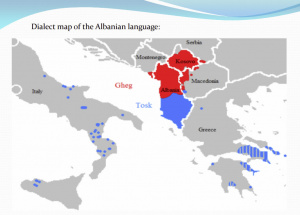Language/Tosk-albanian/Grammar/Nouns
Hi Tosk Albanian learners! 😊
In today's lesson, we will be discussing the basics of Tosk Albanian nouns. We will cover topics such as noun gender, noun declension, and noun pluralization. By the end of this lesson, you should have a good understanding of how to use nouns in Tosk Albanian.
Noun Gender
In Tosk Albanian, nouns are either masculine or feminine. To determine the gender of a noun, you must look at the ending of the word. Generally, nouns that end in -a are feminine, while nouns that end in -i are masculine. However, there are some exceptions to this rule.
Feminine Nouns
Feminine nouns typically end in -a. Examples of feminine nouns include:
- shtëpi (house)
- kafshë (animal)
- lule (flower)
Masculine Nouns
Masculine nouns typically end in -i. Examples of masculine nouns include:
- qytet (city)
- libër (book)
- fjalë (word)
Noun Declension
In Tosk Albanian, nouns can be declined to show different grammatical cases. The most common cases are the nominative, accusative, and dative cases.
Nominative Case
The nominative case is used to indicate the subject of a sentence. To decline a noun into the nominative case, you must add the appropriate ending.
For masculine nouns, the ending is -i. For example, the word qytet (city) would become qyteti in the nominative case.
For feminine nouns, the ending is -a. For example, the word shtëpi (house) would become shtëpia in the nominative case.
Accusative Case
The accusative case is used to indicate the direct object of a sentence. To decline a noun into the accusative case, you must add the appropriate ending.
For masculine nouns, the ending is -in. For example, the word qytet (city) would become qytetin in the accusative case.
For feminine nouns, the ending is -ën. For example, the word shtëpi (house) would become shtëpinë in the accusative case.
Dative Case
The dative case is used to indicate the indirect object of a sentence. To decline a noun into the dative case, you must add the appropriate ending.
For masculine nouns, the ending is -it. For example, the word qytet (city) would become qytetit in the dative case.
For feminine nouns, the ending is -së. For example, the word shtëpi (house) would become shtëpisë in the dative case.
Noun Pluralization
In Tosk Albanian, nouns can be pluralized to indicate more than one of something. To pluralize a noun, you must add the appropriate ending.
For masculine nouns, the ending is -a. For example, the word qytet (city) would become qyteta in the plural form.
For feminine nouns, the ending is -a or -e. For example, the word shtëpi (house) would become shtëpi or shtëpie in the plural form.
If you have any questions, please ask them in the comments section below.
Feel free to edit this wiki page if you think it can be improved. 😎

